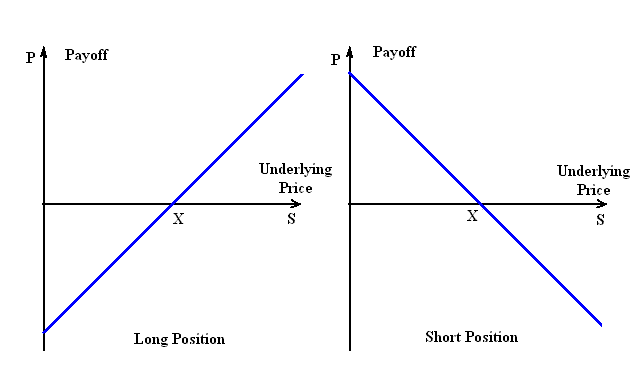Finance Explained- Derivatives (Futures/Forwards)
The world of finance is often over-glamourized and made out to be far more complicated than it is in reality.

One such area of finance that is the poster-child of corporate finance and indeed Wall Street is that of derivatives. One of the least understood topics by your Average Joe, casually slipping the name into a conversation with those less knowledgeable than you is enough inflate their opinion of you tenfold.
Yet these are not particularly complicated beasts to understand. In fact, even I, a 22 year old student with, let's be honest, a fairly average level of intellect and an even lower level of work ethic, find them relatively easy to understand, and would like others to feel the same way too. So with that in mind, here is the first of a series of explanations of derivatives to try and make them more understandable and indeed accessible to the average person on the street.
Futures/Forwards
Put very simply (and these are simple derivatives), a future/forward is just an agreement to either purchase or sell something in the future. They are entered into at a certain point in time, and both parties agree that in another certain point of time in the future, they will exchange some underlying asset at a pre-determined price. It is a contract, thus both parties have no option but to honour their side of the contract, lest they be willing to face legal action.
The long position agrees to purchase the underlying asset, while the short position agrees to sell it to the long position at the pre-arranged price. So let's assume, for example, that you own 1 Bitcoin (lucky you!). You have seen the spectacular price rise, but are worried that it won't run for much longer. You decide to enter into a future contract, where you will sell your 1 Bitcoin in 3 months time for $10,000. You will thus be in the short position on the future.
If the price shoots up to $12,000, you still have to sell your Bitcoin for $10,000, thus you 'lose out'. However, if the price had tanked (as you suspected) to $8,000, you would have protected yourself from the fall. You will thus profit when the price falls, and lose out when the price rises. The long position will have the exact opposite payoff. If the price screams up to $12,000, they still only have to pay $10,000, and then can sell it on the market and realise that profit. If the price falls, they are paying more than the market price and thus are losing.

A big issue with these contracts is counter-party risk. How will you be sure that the person will buy your Bitcoin? They may bugger-off to North Korea to avoid paying. This is the key difference between a future and a forward- a future is regulated by an exchange with a clearinghouse, whereas a forward is just an agreement between 2 parties with no middle man. the clearinghouse makes each party put down some money initially as a margin, then it uses these margin balances to pay whoever is winning every day (e.g. if the price rises, the clearinghouse will use short position's margin to pay the amount they lose to the long position). If your margin falls below a certain level, you will be asked to top it up again, thus both parties are protected from the other party pulling a runner if they are losing.
I hope this was a useful explanation of futures/forwards. I'll continue covering different derivatives in the coming days if the explanations are appreciated!
Happy Steeming!
![]()
Great post, we should be studying how finance is structured from an early age, but it is intentionally gatekept. Is especially important for your age & younger to study the corruption & faults in the system that continues to create so much inequality & greed. Another “crisis” looms, which has historically always been an opportunity for the super rich to buy assets on the cheap while almost everyone else loses 1/2 or more of their “paper” value
Couldn't agree more!
I guess one of the most exciting aspects of the crypto-revolution has been the wealth it has generated for people who weren't necessarily wealthy before, although obviously those with more capacity to take advantage of the wild price swings have benefited the most.
Why do you say another crisis looms? I'd be interested to hear your thoughts.
More than anything another crisis will allow for more wealth redistribution to the top. The same cycle has been repeating since the Great Depression for sure & probably longer. 10 years since the housing crisis & the same corrupt banks that were bailed out are selling the same garbage cdo type baskets & making even larger derivative bets on them.
Meanwhile the average American has gone even farther into margin debt, leveraging their fake paper home gains (house prices are engineered into a balloon so banks can kill profits) to take out equity loans to get in on the “can’t miss” market. Or simply spending well above their means to attempt to keep up with all of the fancy new things the celebrities are showing off. & now they are receiving much worse health care, eating worse food & have far more distractions & disinformation to deal with.
I see a system engineered to control people via debt slavery, disease, envy & fear. Depressions/recessions/wars/false flags are all events used to manipulate the masses into giving up previous rights, freedoms, & above all wealth & quality of life. I have been studying this system closely since the early 2000’s & am I excited to see your generation attack this system with more information than I had to study.
I hope cryptos will be a decentralized tool that the people can use to bring more fairness & equality into life, but I fear they will actually be used by the old system to enforce even more controls & restrictions via the tracking of every single transaction & $ earned.
The more people like yourself working to educate others the better! Education & understanding is key to waking people up to the debt slavery games. We are all meant to be something more than someone else’s monthly income !
Very interesting perspective. Thanks for sharing!
I couldn't agree more-we need to educate ourselves, and you have helped everyone else to do just that with this well thought-out and communicated post.
Finance Explained- Derivatives Derivatives are complex financial instruments whose value is derived from an underlying asset, like stocks, bonds, or commodities. You need to discover that learn more new ideas for traveling. They allow investors to hedge, speculate, or increase leverage, but they can also amplify risk. Common derivatives include futures, options, and swaps. While they can enhance market efficiency, their misuse can lead to significant financial downturns, as witnessed in past crises.